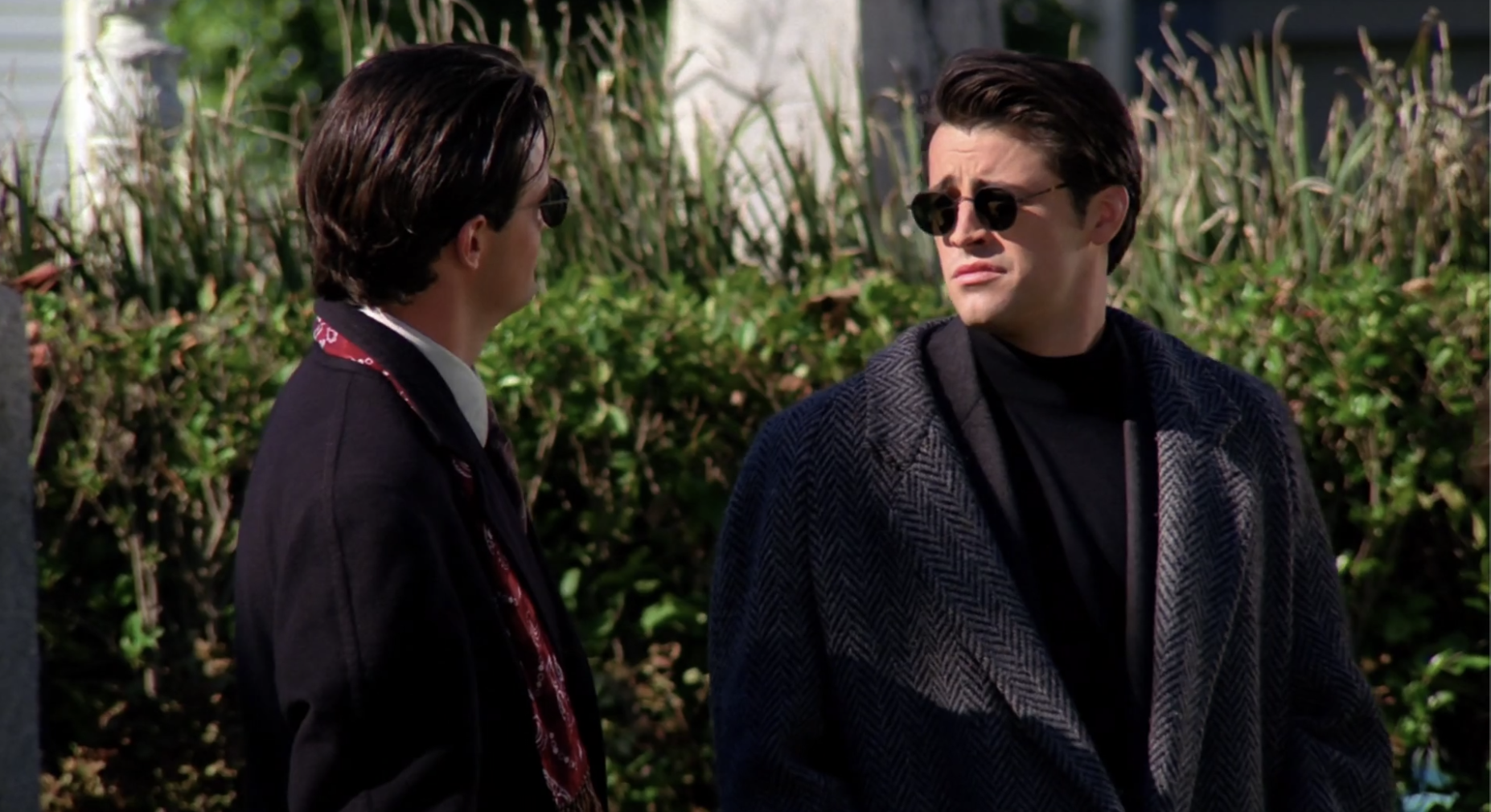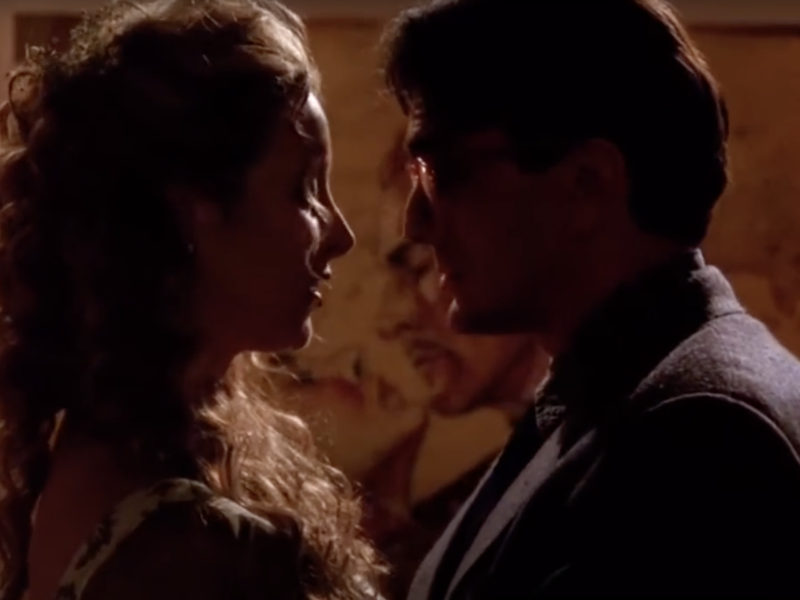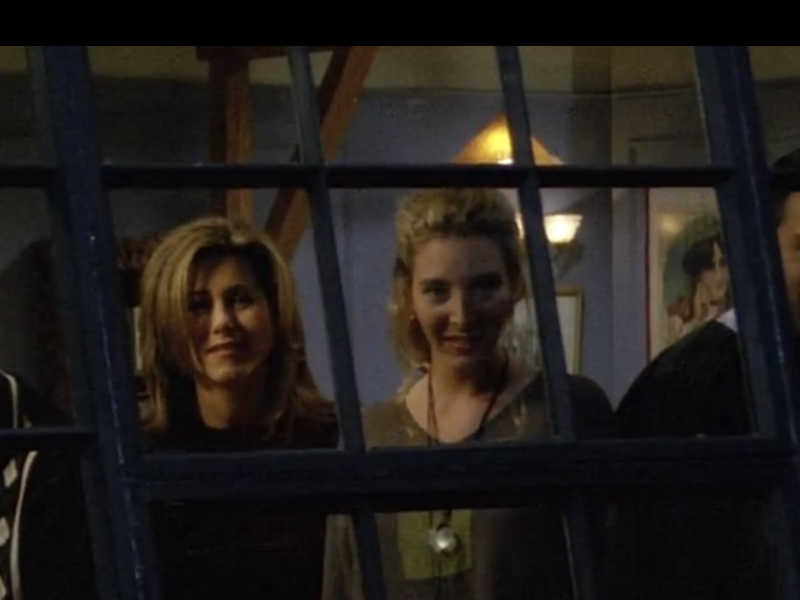Preamble
I don’t like this episode. I haven’t watched it in 9 years, but I know I don’t like it. It made my worst episodes list and for me this is the 9th worst. Now, I don’t know if that ranking will hold up or not, but there’s a chance that by the end of my 236 reviews, one of the bottom most ones will have occurred within the first 9 episodes. My point is I’m not looking forward to this, so I can scarcely go into this with freshly bleached eyes. I don’t like this episode; all this exercise can do is shed some light on why or — and ideally — make me appreciate it a little bit more.
“That’s 22 minutes of your life, you’re never getting back.” -The Mrs.
Plot Summary – Review
A storyline – Monica struggles with her mother’s criticism.
B storyline – Chandler tries to find out why people think he’s gay.
C storyline – The friends attend a funeral.
Let’s start with the storylines, because just from looking at the basic structure, you’ll notice that Nana dying has nothing to do with either. Nana’s death is the catalyst for a barrage scenes and “situationally funny” moments, but none of it comes together. Joey listening to a baseball (football?) game at a wake is humorous, but there’s nothing more to it. Joey listens to a game incognito. When others find out, they listen. That’s it. No consequence, no hijinks.
Joey Storyline Rewrite – Losing The Big Game Feels Like Losing Someone You Love
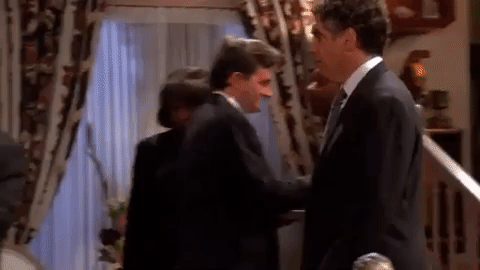
Look, allow me to fanfic for a minute. Imagine Joey’s listening to his radio during the visitation (where they can approach the casket) but once they get there, he’s struggling with the reception on his radio. Maybe he approaches the officiant asking where the satellite is and the officiant isn’t understanding so Joey says something to the effect of, “if someone were trying to get better reception where would they go?” The officiant leads Joey to a quiet prayer room, “We can hear their messages most clearly in this room.”
Cut to other scenes then return to Joey who is taking awkward “steps” around the halls and rooms trying to get better reception. He accidentally bumps into a kind old lady. He’s a little embarrassed but the lady is sweet and tells him, if he’d like to “go first” he can. Joey looks up and realizes he’s in line to kneel at Nana’s coffin and whisper prayers. Because he’s embarrassed however, he says sure and goes up to the stool and kneels… however, this is when he realizes, the reception for the game is crystal clear.
Other scenes ensue and by the time we return, we see a lengthy line to pay respects to Nana because Joey hasn’t moved. Every time someone makes a move to say something to Joey, he either bursts out with a loud “No!!” or “Why!?” or slams his fist on the coffin or he weeps. Everyone assumes it’s due to Joey’s emotional state at losing Nana… but we know it’s because his team is losing.
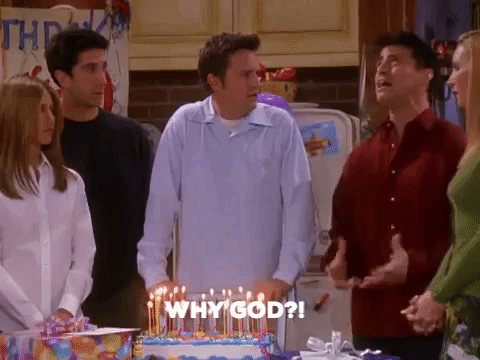
What I mean to say with an example like this is, Nana’s funeral — the situation — could impact Joey’s story. He could have a clear arc within the context of plot. Instead, Joey listens to the game on his radio. Jack finds out he’s listening and joins him. End. It’s written like a punchline, not a script.
Returning To the Plot Overview
For an episode to attempt a comedy at a funeral, they didn’t bring the funny or the sentiment. It feels like it was written by people who have never lost anyone before, like they don’t know how funerals or wakes work. If you’re going to do an episode about death, go all in. Have the friends talk to each other about their beliefs (or lack thereof). If that’s too racy, then beeline to the alternative, “life is short” so the friends decide they’re going to make changes — almost like setting New Year’s Resolutions.
As it is, Nana’s death adds nothing to the stories being told. People think Chandler’s gay… what does this have to do with the funeral? Nothing. Monica and Judy (her mother) talk about their relationship loosely disguised through Judy and her mother (Nana)… what does this have to do with the funeral? Nothing, really. There is no scene between Judy and Monica that couldn’t have happened at any other time. Nana could’ve died five years ago and Monica could still say, “If you had told your mom the truth, do you think it would’ve been better?” Being at the funeral doesn’t change anything.
The Monica Rewrite – Stop Sharing the Parents!
There’s two ways to fix this, one easy and one hard. The hard one would involve rewriting two other episodes, so my recommendation is the easy route which is simply to stop reminding us Ross and Monica have the same parents. We can have an episode where Ross and Jack only have scenes together and an episode where only Monica and Judy have scenes together. They don’t need to mix and match for our benefit.
The Hard Rewrite – Change the Canon
Say what you will about Garden State, but the funeral is the impetus for bringing the family (and friends) back together. If Monica hadn’t seen her mother in the 4-5 years she’d been living in the city, then hey! Now Nana’s death is relevant to the scenes that follow. It’d explain why Monica doesn’t say anything to the countless insults her mother lobs at her, she wants the path of least resistance — which is why her final confrontation with her mother would be poignant.
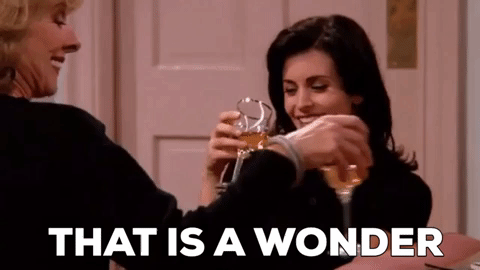
However in episode 2, Monica has her parents over for dinner and no one is estranged. And Monica even calls her mom when the blackout occurs in the 7th episode, so to take this route would require some foresight and rewriting. So instead, here’s what they should’ve done.
The Easy Rewrite – Stop Swapping Parents
Monica’s scene with her dad is one of the strangest I’ve seen. They sacrificed comedy for “keeping things even.” They wanted to show at least one scene between Ross and his dad, and Ross and his mom, and Monica and her dad, and Monica and her mom, but if the main storyline is about Monica and her mom, then why do we have the scene with Monica and Jack? The whole scene where Ross is helping Judy pick a dress for Nana should’ve been Monica and Judy. It makes sense from a narrative standpoint since the dialogue that’s important in the scene is Judy and Aunt Lillian talking about how overly critical Nana was.
Aunt Lillian: You know whatever we pick, she would’ve told us it’s the wrong one.
Judy: You’re right. We’ll go with the burgundy.
Why isn’t Monica here listening to this? Moreover, it fits with the humor up to this point wherein Monica has silently listened to her mother criticizing her. Every time she insults Monica, we get a shot of Monica staring wide-eyed with a gaping mouth. This would make Monica’s final dialogue with her mother have more buildup and more impact… but for some reason — my guess is to remind us Monica and Ross have the same parents — Monica has a scene with Jack that’s vapid and should’ve been Ross and Jack. Ross has confessed he doesn’t know how he feels about Nana’s death.
Joey: You guys okay?
Ross: I don’t know, it’s weird. I mean, I know she’s gone, but I just don’t feel–
Ross doesn’t know how to feel. To a degree, this reflects Jack’s feelings on it. He doesn’t mourn Nana as much as he searches inward. What about when he dies? His line:
Jack: Everyone thinks they know me. Everyone says “Jack Geller, so predictable!” Maybe after I’m gone, they’ll say “Buried at sea… Huh?”
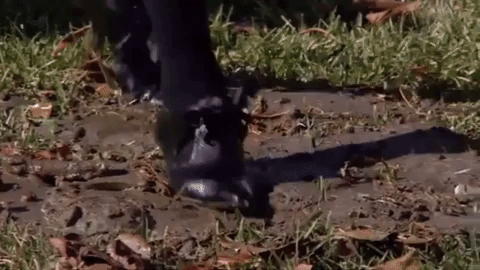
Maybe this lingers in Ross’ head and he thinks, “Hey, Rachel is giddy over Paolo calling from Rome. He flits off to Rome, I could flit off to Rome, but I don’t because I’m too predictable… maybe I need to make a grand gesture.” Maybe this is what leads Ross to falling into the open grave. Rachel steps in mud and Ross does something out-of-character and a little grandiose. He takes off Rachel’s shoes and throws them, tells her to send them back to Italy and uses the funeral as a pretense, “If he cared about you, he’d be here. We have so little time, what matters is the time we spend together.” Of course, Rachel reminds Ross the shoes are pricey and she’s not walking back to the funeral procession shoeless, so Ross course-corrects and starts taking off his shoes to give them to Rachel. While trying to remove a shoe (holding his foot in both hands, he hops on one foot, loses balance and falls in an open grave).
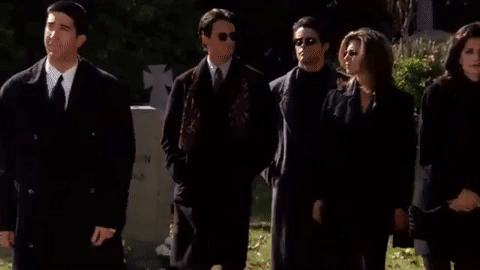
Not my best, but better than:
(Weird, closeup of Rachel’s foot stepping in mud.)
Rachel: Oh no! My new Paolo shoes!
Ross: Oh, I hope they’re not ruined.
And the friends move on.
Chandler’s Storyline – Gay For No Reason
Chandler’s “gay” storyline is almost entirely separate from everything else with his 3 office scenes having a clear structure of beginning, middle, end:
- Scene 1: Shelly tries to set Chandler up on a date with a guy.
- Scene 2: Chandler tells Shelly, if he were to be set up on a date with a guy, he has a preference.
- Scene 3: Lowell tells Chandler he’s obviously not gay, but if he were, he shouldn’t be picky, and settle for what he can get.
This is one of those stories though that feels out of place. Chandler has a quality that makes people think he’s gay. Okaaaay… what of it? Does this mean he’s missing opportunities for dates? Is this why women seek him out, they want to be friends without fear of towing the line between friend and more than friend? Is it causing his gay co-workers to treat him differently? Is his boss gay and offering him a raise or is a co-worker accusing him of sexual harassment and Chandler’s shocked to find out it’s a man accusing him? I’m jut throwing stuff out here because I don’t get the joke.
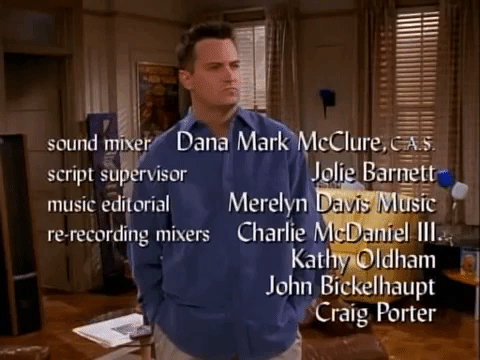
Maybe I’m not sensitive enough, but this plot doesn’t even read “homophobic” to me because, at least from my perspective, Chandler isn’t scared of being perceived gay as much as he is curious what it is that makes him seem gay?
Chandler: Well this is fascinating. So–uh–what is it about me?
Phoebe: I don’t know, cus you’re smart, you’re funny–
Chandler: Ross is smart and funny — do you ever think that about him
All: Yeah, right!
Chandler: What is it?!
Monica: Okay, I don’t know, you just– you have a quality.
All: Yes. Absolutely. A quality.
Chandler: Oh, oh, a quality, good, because I was worried you guys were gonna be vague about this.
Even when Ross outs Chandler at the funeral, it’s not as though this kills his chance with a woman, who walks away saying, “You were right!” to her friend, indicating that she wasn’t seriously considering Chandler anyway.
The “gay” element has no impact on Chandler’s day-to-day or something that’s “holding him back.” Plus, they don’t really explore his fraternity with the guy friends, so what is it for? Cus that’s the thing, if it was 90s stereotypical homophobia, I — and don’t take this out of context — but I’d almost prefer that. At least then, I’d know “what” Chandler being perceived as gay is “for,” i.e. typically 90s homophobia, got it. But there’s none of that. And it’s obviously not trying to give Chandler a case of the “not-gays” since — if you’ve watched the previous three episodes — Chandler has broken up with Janice, romanced Aurora and gushed over Jill Goodacre; it’s apparent, he’s not gay.
To me, this leads me to think the office scenes with Chandler work because they were added later. Like, if I’m being blunt about it, a part of me wonders if the “joke” was meant to be the friends always thought Chandler was “Jewish” and were surprised to learn he wasn’t. I realize this is a stretch, but hear me out.
Chandler’s A Jew… ish
Due to Nana’s death, the friends briefly share their thoughts on the afterlife.
Ross: I don’t know, it’s weird. I mean, I know she’s gone, but I just don’t feel–
Phoebe: [M]aybe no one ever really goes. Ever since my mom died, every now and then, I get the feeling that she’s like right here, y’know? … And Debbie, my best friend from junior high, got struck by lightning on a miniature golf course. I always get this really strong Debbie vibe whenever I use one of those little yellow pencils.
Joey: Now see, I don’t believe any of that. I think once you’re dead, you’re dead! You’re gone! You’re worm food!
I half-suspect there’s a version of this scene on the cutting room floor where they talk about the afterlife and their thoughts on it. Perhaps Joey’s line was Chandler’s and this is when the friends are surprised that he feels that way since they all thought he was Jewish (like Monica and Ross). This lends itself to the innocuous but curious nature of Chandler’s inquisition. What is it that makes him appear Jewish?
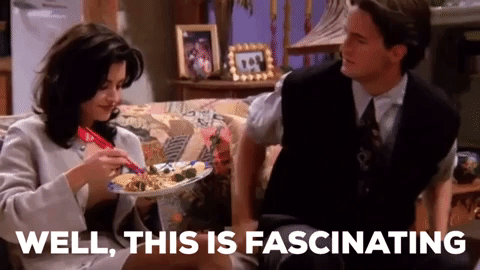
And look, I’m not saying this would be better, but it makes a little more sense. Common stereotypes (that unfortunately persist today — I’m looking at you Howard from The Big Bang Theory and Schmidt from New Girl) include qualities that Chandler has. Effeminate behavior, humor, intelligent, well-paying job, as well as the paranoid, self-conscious, squirrelly Woody Allen-like charm are all cards in Chandler’s deck.
What I like about this angle, is it would’ve been an opportunity to combat the idea that you can look Jewish. So Chandler curiously asking people what it is that makes him “look” Jewish, the friends inability to come up with anything, would help make the case. What’s more, it actually makes the line:
Chandler: Ross is smart and funny, do you ever think that about him?
More humorous because Chandler’s implying an actual Jewish man isn’t giving them the air that he’s Jewish, but Chandler is?
This could then actually play into the Shelly — at the office — storyline as the first scene could be that she’s just found someone perfect for him, who works in accounting. Chandler says Saturday he’s got a funeral — to which Shelly interrupts, “I’m sorry!” to which Chandler responds with something like, “Nah, I didn’t have any plans anyway” — but he’d be free Sunday and she could make a comment about how she didn’t think he went out on the Sabbath which takes him equally aback.
Chandler then, at the funeral with his friends, calls into question the date Shelly set up and is realizing maybe she set him up with someone in “accounting” due to her prejudice. Much like how Chandler responds saying he “could get a Brian,” he similarly follows the principled path, “just because he’s not Jewish doesn’t mean someone should assume he’d only go out with someone that is also Jewish.”
Of course, perhaps Chandler and the girl at the wake actually hit it off, but it’s because (again, 90s stereotype) she attracted to him because he embodies the “good Jewish boy” stereotype. However, rather than fight it, he embraces the persona pushed on him because he wants to date the girl who preemptively tells Chandler that she’s interested, but she can only be with a man who meets XYZ criteria, including upholding the Jewish faith which is why when Ross approaches in his drugged state, instead of saying, “If you want to be gay, be gay!” he says, “If you don’t wanna be Jewish, then don’t be.”
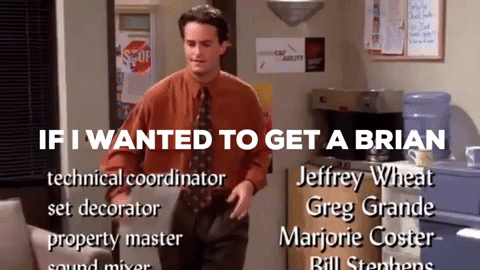
This then motivates Chandler to approach Shelly at work on Monday and call off the arranged date for fear he’s being set up to go on a date with a Jewish woman who — no doubt — he’d eventually be found as a fraud. Without wanting to “out” Shelly for her prejudice and cover himself in case he’s wrong, he discreetly says, “Listen, Shelly, I don’t know what you’ve heard about me, but I’m not sure dating anyone from work is a good idea, so I’d rather just not do it.” To which Shelly then can say, “That’s too bad, I think you and Lowell would’ve made a cute couple.” To which you then get your punchline of Chandler saying, “Lowell?!” i.e. it wasn’t that Shelly set Chandler up because she thought he was Jewish, it was that she set Chandler up because she thought he was gay.
Again — and I’ve said this in my How to Diversify Friends post, but if I’ve offended anyone with this concept, I apologize and will happily walk back anything here. My point in providing this example, is simply to show how you could make Chandler’s story relevant to the funeral — the main event in the plot — and have the “presumed” identity actually play a factor in his story. As the story is, Chandler giving the impression he’s gay, doesn’t have any stakes or repercussions, and I think part of the reason is because it is irrelevant to everything else that’s happening, so the Jewish angle makes more sense as it’d come up organically within the context of the story (talking about death and the afterlife) and could combat something people wrongly profile others as.
Some Things I Actually Liked
The episode isn’t all bad, there are some neat jokes and even visual scenes I enjoy.
For starters, I really like this scene (see image) of Ross and Jack & Monica and Judy all sitting so that they mirror their gender counterpart. It’s just a neat way of showing they’re all related and I like it.
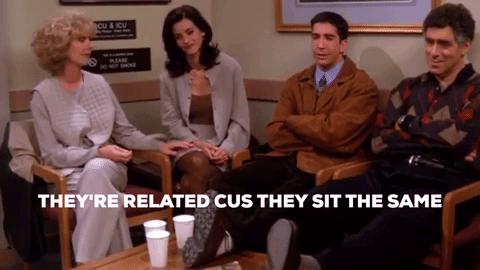
(As an aside, this is how visual information should be, not the end scene where the camera zooms out as Ross says, “Huh, looks like a fun gang.”)
On a positive side, I think Ross’ ruse is funny.
Ross: Although y’know back in college, Susan Salvidor did.
Chandler: You’re kidding! Did you tell her I wasn’t?
Ross: No. No, just cus I kinda wanted to go out with her too, so I told her, actually, you were seeing Bernie Spellman… who also liked her.
I think the line where Judy says to Monica “Nana would’ve hated this” and Monica essentially says, “Duh, it’s her funeral” is funny.
I like the sequence of Chandler arguing the principle of him being hypothetically gay to Shelly, i.e. if I wanted a Brian, I could get a Brian.
And I actually like the scene of Ross in the closet, acting like a retail clerk, pulling out shoes. I stand by that this should’ve been Monica, but I like these kind of jokes where they starts in reality, but then characters realize their situation and start “playing the part” — it’s funny and self-aware and I love it. And while that may sound specific to this one scene, you need watch TOW the Breastmilk where Joey is dressed as a cowboy and Chandler starts serving him drinks and talking to him like he’s in a saloon — this is still my favorite scene in all of Friends.
Analysis – Disembodied Voice
For an episode that relies heavily on visual gags (almost no jokes), there’s an emphasis on the disembodied voices that we rely on or govern our behavior.
- Judy & Aunt Lillian emotional state is influenced by what Nana would say. They spend the funeral preparation playing the role of Nana, rather than doing what they want, they keep saying what they think Nana would want and what she’d say. Their dialogue and actions are governed by someone who’s no longer alive; a disembodied voice.
- Joey’s emotional state is entirely dependent on the radio signals.
- Rachel’s emotional state is based on her international phone call with Paolo. He’s not present, but him sending her shoes and thinking of her, is what causes her highs and lows throughout the episode.
- Ross’ most “emotional” moment comes in the form of Sweet N’ Lows that are sort of Nana mementos.
- Phoebe of course believes her mother’s presence hovers nearby and her old friend inhabits small pencils.
It’s not a strong analysis, but there is something there.
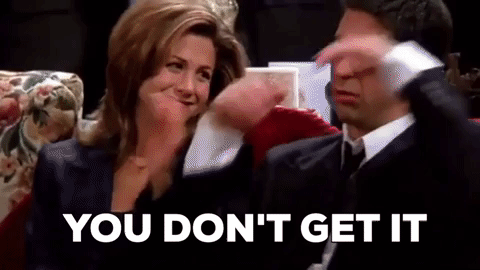
Closing Thoughts – Yup, Still Hate It
Watching this again, I get the impression they had written a two-part episode and then cut it down to 22 minutes. There’s no payoff to things that are setup and an obnoxious absence of jokes.
And you know, I get the impression this could all be because they were afraid. It was either Bukowski or Hemingway who said “What a writer has to sell is confidence” and this episode REEKS of fear. They don’t want to say “what” Nana is dying of for fear they’ll make it real. They don’t want to explore the possibility that everyone dies and becomes worm food because that’s too scary. They don’t want to have the friends clash over “afterlife” beliefs because it’d be too divisive — and yes, I think the friends having religious preferences would be more controversial than one of them being gay or homophobic because then you get the zealots who won’t support people who like Chandler because he’s antithetical and people would question if the show was actually plugging Satan into a whole generation’s head, blah blah blah.
Meanwhile, they don’t want the core friends to lose someone close to all of them because it’d be too sad. So instead of doing an episode on something serious… they play it safe.
An old woman is dying. Of what? Can’t say. Is she in pain? Can’t say. What can you say? No much, because we’re going to show you Nana so we can provide a quick visual gag of her “not being dead.” Why? Because we think someone not being dead for a second is funny.
Same with Chandler’s gay story. LGBTQ culture, mannerisms, even stereotypes — none of it is on display. Instead “gay” is just a perception. It adds nothing and shamelessly ties a group of people for no reason.
Meanwhile, even what few jokes are in the episode just fall flat:
Phoebe: Hi, sorry I’m late, I couldn’t find my bearings.
Rachel: Oh, you mean your earrings?
Phoebe: What’d I say?
Apparently that’s a joke because the laugh track plays but I can’t tell you why they think that’s funny. You’d need some sort of followup or do a visual gag of Phoebe with “bears” on her “earrings.”
The Sentiment Doesn’t Hit
Meanwhile, all the sentimental moments don’t “hit” because the pacing is choppy with too many locations. And they never feel earned because the pacing is so terrible. The moment where Judy realizes she’s criticizing Monica the way her mother did to her is touching and inspired and Courteney Cox and Christina Pickles do a great job to show this… the problem is you lose this storyline among all the fluff.
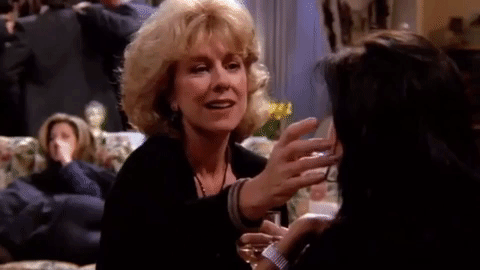
The way sentimental moments work is when they have buildup. Judy and Monica’s buildup was cooking, but then they hit a sharp right turn, cutting them off from each other and then attempt to pick back up where they left off. The pacing kills this moment — which is the real tragedy.
Ross’ moment with the Sweet N’Lows also has no build up. The musical queue falls flat because we don’t know Ross’ state of mind when it happens. He’s fetching shoes and playing the role of retailer, it’s not as though he’s having a heart to heart about how he wishes his last moment with her wasn’t him “screaming” at her being alive, but sharing a real moment with her. Then at least him being showered would have some sentimental impact since it can be interpreted as a sign. Instead, it’s just a visual thing that happens.
Additionally, Nana’s death has zero build up. The reason her returning from the dead falls flat is because you need longer on “dead Nana” or more buildup to “dying Nana”. It can’t be just Monica giving her grandma a kiss on the head but the whole family saying their final words until BAM Ross goes and she’s up!
At the very least you need a doctor setting up dry exposition so we believe she’s really dead. And again, I get why they don’t, because then you’d have to provide a diagnosis and symptoms — even if they’re generic — it makes it too real. So instead, what she’s dying of is nebulous; any doctor scenes are cut out; and instead you get Monica and Ross saying goodbye to a character we’ve never met with no real indication she’s dead.
In short, they played it too safe and the whole episode suffers for it.
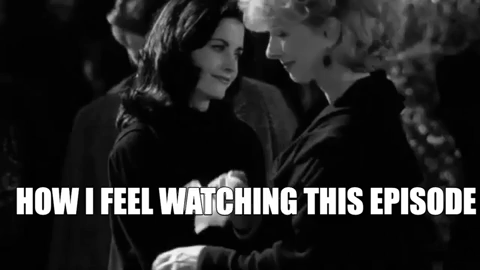
Hell, I think they put Ross on drugs because they realized, “Hey, we don’t have enough jokes.” So they made Ross drugged so the flat lines could have a little more flavor.
Rank
It should be obvious, but this one goes straight to the bottom with concrete boots. At the moment, it blows my mind that my bottom two episodes are those credited to the creators Marta Kauffman & David Crane. That said, make no mistake, there’s oceans of difference (as I’m sure time will show) between TOW the Sonogram at the End and TOW Nana Dies Twice. But again, I genuinely believe this was a two-part episode that they massively cut down.
I’m good to never watch this one again.
- 105: TOW the East German Laundry Detergent
- 104: TOW George Stephanopoulos
- 107: TOW the Blackout
- 101: TOW Monica Gets a Roommate
- 106: TOW the Butt
- 103: TOW the Thumb
- 102: TOW the Sonogram at the End
- 108: TOW Nana Dies Twice

